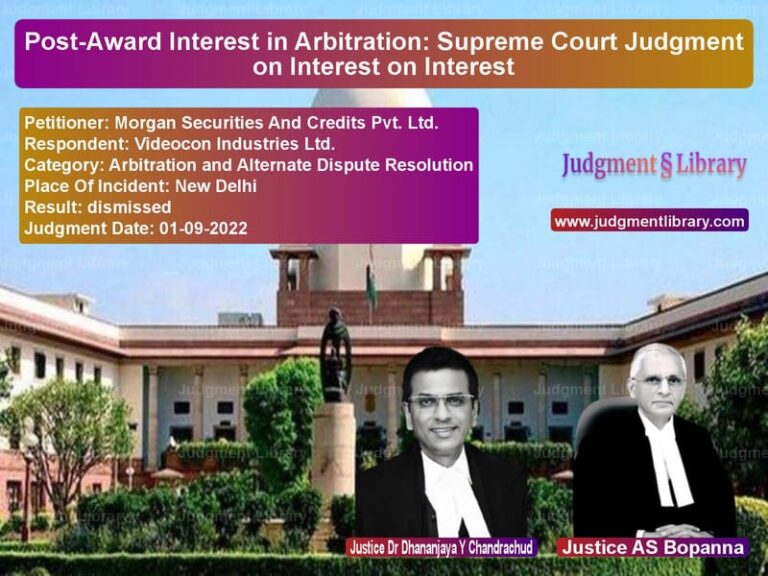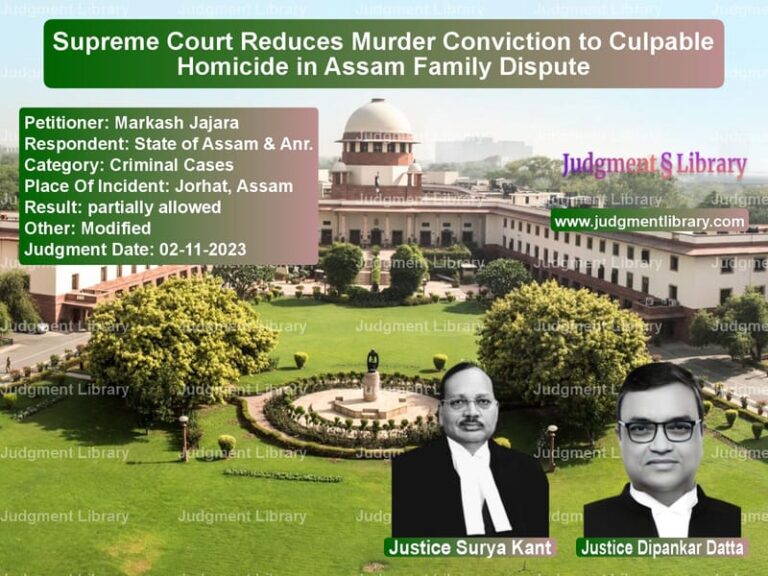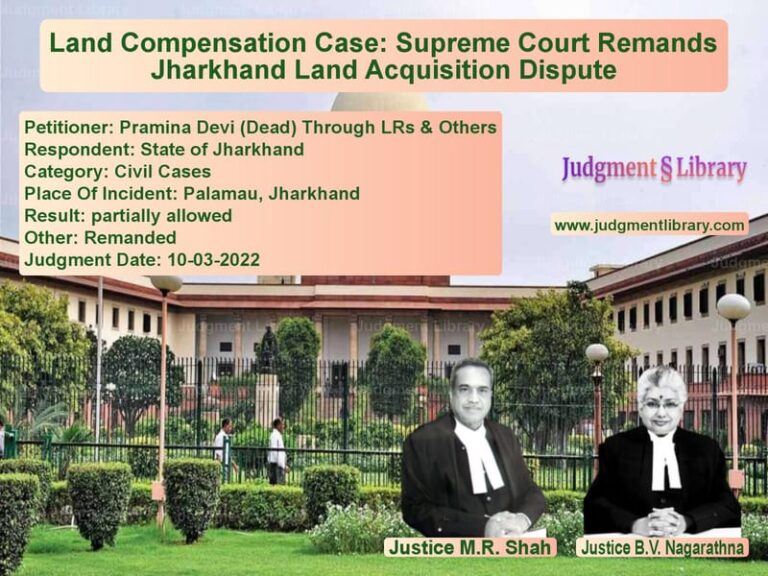Murder Case Acquittal Reversed: Ballu and Halki Bahu’s Appeal Revisited
The case at hand presents a legal battle between the appellants, Ballu @ Balram @ Balmukund and Halki Bahu @ Jamna Bai @ Jamuna Bai, and the respondent, the State of Madhya Pradesh. The appellants were initially acquitted of charges under Sections 302 (murder), 201 (causing disappearance of evidence), and 34 (common intention) of the Indian Penal Code by the learned 2nd Class Sessions Judge in Damoh. However, this acquittal was reversed by the High Court, which led to the appellants being convicted of the murder of Mahesh Sahu. The appellants now challenge this decision in the Supreme Court.
At the heart of this case is the brutal murder of Mahesh Sahu, who had been in a love relationship with Anita, the daughter of Jamuna Bai (appellant No. 2) and the sister of Ballu (appellant No. 1). The murder occurred due to enmity between the family members of the deceased and the appellants, with Mahesh Sahu allegedly killed in furtherance of a common intention.
Background of the Case
The deceased, Mahesh Sahu, had been in a romantic relationship with Anita, but they were separated when Anita married another person. Despite the marriage, Mahesh and Anita continued to correspond, a fact that reportedly angered Ballu, leading to threats and eventually the murder of Mahesh on June 7, 1992.
The prosecution relied heavily on circumstantial evidence, with several witnesses testifying that they saw Ballu dragging Mahesh’s body and Jamuna Bai washing bloodstains. Despite this evidence, the learned trial judge acquitted the appellants, finding that the prosecution failed to establish the case beyond reasonable doubt. This judgment was appealed by the State, leading to the High Court’s conviction of the appellants, which is now under review by the Supreme Court.
Petitioner’s Arguments
The petitioners, represented by Mr. Varun Thakur, raised several points in their appeal against the High Court’s decision:
- The trial court’s acquittal was well-reasoned, with the evidence presented not being sufficient to prove the guilt of the appellants beyond reasonable doubt.
- The High Court’s intervention in reversing the acquittal was unjustified, as the prosecution had failed to establish a clear and complete chain of evidence linking the appellants to the murder.
- In an appeal against acquittal, the scope for interference is limited. Unless the findings of the trial court are perverse or impossible, the appellate court should refrain from overturning them.
Respondent’s Arguments
On the other hand, the respondent-State, represented by Shri Pashupathi Nath Razdan, argued strongly in favor of the High Court’s decision:
- The trial court had misread the evidence and failed to appreciate the gravity of the circumstances, which clearly pointed to the guilt of the appellants.
- The testimonies of Beni Prasad (PW-1), the father of the deceased, and Sumitra Bai (PW-6), the mother, along with medical evidence, were sufficient to establish that the appellants were indeed the perpetrators of the crime.
- The appellants’ behavior, including dragging the body and washing blood stains, was incriminating evidence that was overlooked by the trial judge.
Court’s Review of the Evidence
The Supreme Court, in reviewing the case, cited the principles laid down in Sharad Birdhichand Sarda v. State of Maharashtra regarding circumstantial evidence. The Court emphasized that:
“The circumstances from which the conclusion of guilt is to be drawn must be fully established, and the facts should be consistent with the hypothesis of the guilt of the accused, excluding every other possible hypothesis.”
The Court further elaborated on the need for a conclusive chain of evidence in circumstantial cases, noting that any gaps in the evidence would undermine the case for conviction.
Trial Court’s Findings
The learned trial judge, after an extensive review of the evidence, made the following key findings:
- The testimony of Beni Prasad (PW-1) was found to be inconsistent and contradictory with his previous statement, raising doubts about its reliability.
- The behavior of Beni Prasad in not immediately reporting the dragging of the body to anyone, especially considering the proximity of the Police Chowki, was deemed unnatural and suspicious.
- The statements of other witnesses, including Sumitra Bai (PW-6) and Raju (PW-4), were either unreliable or turned hostile during cross-examination.
- The physical evidence, such as the alleged bloodstains on the appellants’ clothes and the recovery of a knife, was not conclusively linked to the crime, as there was no proof that the blood was human blood.
- The delay in the arrest of the appellants, despite the proximity of the police station, created further doubt about the prosecution’s version of events.
High Court’s Findings
The High Court, after reviewing the case, reversed the trial court’s decision, stating that:
“The witnesses may have made improvements in their testimonies, but their overall statements cannot be discarded entirely.”
The High Court also found the testimony of the Investigating Officer, S.K. Banerjee (PW-15), to be credible, despite the trial court’s rejection of it. Additionally, the High Court relied on forensic evidence, including bloodstains on the articles recovered from the scene, to link the appellants to the murder.
Read also: https://judgmentlibrary.com/supreme-court-cancels-bail-of-accused-in-ghaziabad-murder-case/
Supreme Court’s Judgment
After carefully reviewing the evidence and the arguments presented, the Supreme Court concluded that the High Court had erred in reversing the acquittal. The Court observed:
“The findings of the learned trial judge are based on a correct appreciation of the evidence. The High Court’s intervention was based on conjectures and surmises.”
The Supreme Court further stated that the trial judge’s findings were not perverse or impossible, and in cases of acquittal, the appellate court should only interfere if the trial court’s conclusions are fundamentally flawed.
Conclusion
In light of the above analysis, the Supreme Court quashed the High Court’s judgment and acquitted the appellants of all charges. The Court emphasized the importance of ensuring that convictions are based on solid, irrefutable evidence, and not on speculative or circumstantial reasoning alone.
The judgment serves as a reminder of the need for careful and detailed examination of all available evidence in criminal cases, particularly those relying on circumstantial evidence. The presumption of innocence must be upheld, and the prosecution must prove its case beyond reasonable doubt before a conviction can be secured.
Read also: https://judgmentlibrary.com/supreme-court-transfers-investigation-of-2013-delhi-murder-case-to-cbi/
Petitioner Name: Ballu @ Balram @ Balmukund.Respondent Name: State of Madhya Pradesh.Judgment By: Justice B.R. Gavai, Justice Sandeep Mehta.Place Of Incident: Damoh, Madhya Pradesh.Judgment Date: 02-04-2024.
Don’t miss out on the full details! Download the complete judgment in PDF format below and gain valuable insights instantly!
Download Judgment: ballu-@-balram-@-bal-vs-state-of-madhya-prad-supreme-court-of-india-judgment-dated-02-04-2024.pdf
Directly Download Judgment: Directly download this Judgment
See all petitions in Murder Cases
See all petitions in Bail and Anticipatory Bail
See all petitions in Fraud and Forgery
See all petitions in Judgment by B R Gavai
See all petitions in Judgment by Sandeep Mehta
See all petitions in allowed
See all petitions in Quashed
See all petitions in supreme court of India judgments April 2024
See all petitions in 2024 judgments
See all posts in Criminal Cases Category
See all allowed petitions in Criminal Cases Category
See all Dismissed petitions in Criminal Cases Category
See all partially allowed petitions in Criminal Cases Category







